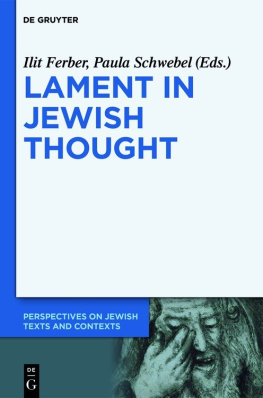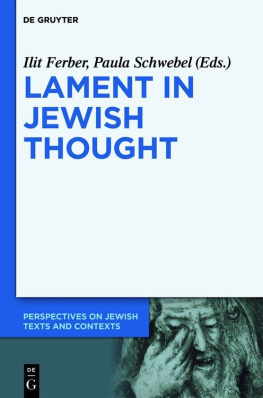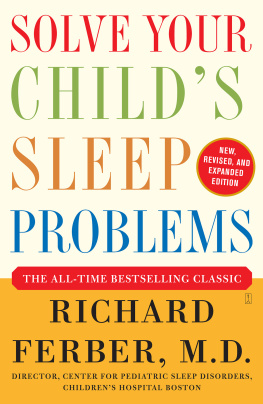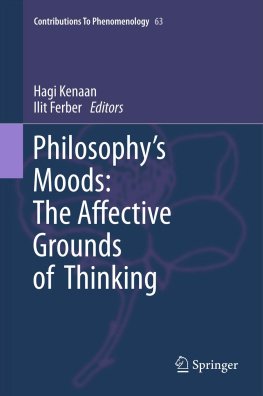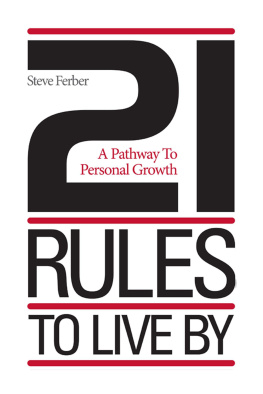Ilit Ferber - Lament in Jewish Thought
Here you can read online Ilit Ferber - Lament in Jewish Thought full text of the book (entire story) in english for free. Download pdf and epub, get meaning, cover and reviews about this ebook. year: 2014, publisher: De Gruyter, genre: Religion. Description of the work, (preface) as well as reviews are available. Best literature library LitArk.com created for fans of good reading and offers a wide selection of genres:
Romance novel
Science fiction
Adventure
Detective
Science
History
Home and family
Prose
Art
Politics
Computer
Non-fiction
Religion
Business
Children
Humor
Choose a favorite category and find really read worthwhile books. Enjoy immersion in the world of imagination, feel the emotions of the characters or learn something new for yourself, make an fascinating discovery.
- Book:Lament in Jewish Thought
- Author:
- Publisher:De Gruyter
- Genre:
- Year:2014
- Rating:5 / 5
- Favourites:Add to favourites
- Your mark:
- 100
- 1
- 2
- 3
- 4
- 5
Lament in Jewish Thought: summary, description and annotation
We offer to read an annotation, description, summary or preface (depends on what the author of the book "Lament in Jewish Thought" wrote himself). If you haven't found the necessary information about the book — write in the comments, we will try to find it.
Lament in Jewish Thought — read online for free the complete book (whole text) full work
Below is the text of the book, divided by pages. System saving the place of the last page read, allows you to conveniently read the book "Lament in Jewish Thought" online for free, without having to search again every time where you left off. Put a bookmark, and you can go to the page where you finished reading at any time.
Font size:
Interval:
Bookmark:
Vivian Liska
Robert Alter, Steven Aschheim, Richard I. Cohen, Mark H. Gelber, Moshe Halbertal, Geoffrey Hartman, Moshe Idel, Samuel Moyn, Ada Rapoport-Albert, Alvin Rosenfeld, David Ruderman, Bernd Witte

e-ISBN (EPUB) 9783110395310
e-ISBN (PDF) (EPUB) 978-3-11-039531-0
ISSN 2199-6962
A CIP catalog record for this book has been applied for at the Library of Congress.
Copyright: Chagall SABAM BELGIUM 2014
| Job | Jobs Lamentation. 1918. Trans. Paula Schwebel. 321323 in this volume. German original of Scholems translation is Hiobs Klage, Tb 2 544547. |
| Lament | On Lament and Lamentation. 19171918. Trans. Lina Barouch and Paula Schwebel. 313319 in this volume. For German original, see Klage below. |
| Arcades | Walter Benjamin. The Arcades Project . Trans. Howard Eiland and Kevin McLaughlin. Cambridge, MA: Harvard University Press, 1999. |
| CC | Walter Benjamin. On the Concept of Criticism in German Romanticism. 1919. SW 1 (see below) 116220. |
| CSB | Gershom Scholem and Walter Benjamin. The Correspondence of Walter Benjamin and Gershom Scholem: 19321940 . Trans. Gary Smith and Andre Lefevre. New York: Schocken Books, 1989. |
| CWB | Walter Benjamin. The Correspondence of Walter Benjamin: 19101940 . Ed. Gershom Scholem and Theodor W. Adorno, trans. Manfred R. Jacobson and Evelyn M. Jacobson. Chicago: University of Chicago Press, 1994. |
| GS | Walter Benjamin. Gesammelte Schriften . 7 vols. Ed. R. Tiedemann et al. Frankfurt am Main: Suhrkamp, 19721991. |
| Klage | Gershom Scholem. ber Klage und Klagelied. 19171918. Tb 2 128133. For English translation, see Lament above . |
| Language | Walter Benjamin. On Language as Such and On the Language of Man. Trans. Edmund Jephcott. SW 1 6274. For German original, see Sprache below . |
| LY | Gershom Scholem. Lamentations of Youth: The Diaries of Gershom Scholem, 19131919 . Ed. and trans. Anthony David Skinner. Cambridge, MA: Harvard University Press, 2007. |
| OG | Walter Benjamin. The Origin of German Tragic Drama . 1925, pub. 1928; trans. 1977. Trans. John Osborne. London: Verso, 1998. |
| Sprache | WalterBenjamin.ber Sprache berhaupt und ber die Sprache des Menschen. 1916. GS 2.1 140157. |
| SW | Walter Benjamin. Selected Writings . 4 vols. Michael Jennings et al. Cambridge, MA: Belknap-Harvard University Press, 19962003. |
| Tb | Gershom Scholem. Tagebcher nebst Aufstzen und Entwrfen bis 1923. 2 vols. Ed. Karlfried Grnder. Frankfurt am Main: Jdischer Verlag im Suhrkamp Verlag, 19952000. |
| WGF | Gershom Scholem. Walter Benjamin: Die Geschichte einer Freundschaft . Frankfurt am Main: Suhrkamp, 1975. For English translation, see WSF . |
| WSF | Gershom Scholem. Walter Benjamin: The Story of a Friendship . Trans. Harry Zohn. Philadelphia: Jewish Publication Society of America, 1981. Rprtd. New York: New York Review Books, 2003. For German original, see WGF . |
Font size:
Interval:
Bookmark:
Similar books «Lament in Jewish Thought»
Look at similar books to Lament in Jewish Thought. We have selected literature similar in name and meaning in the hope of providing readers with more options to find new, interesting, not yet read works.
Discussion, reviews of the book Lament in Jewish Thought and just readers' own opinions. Leave your comments, write what you think about the work, its meaning or the main characters. Specify what exactly you liked and what you didn't like, and why you think so.

